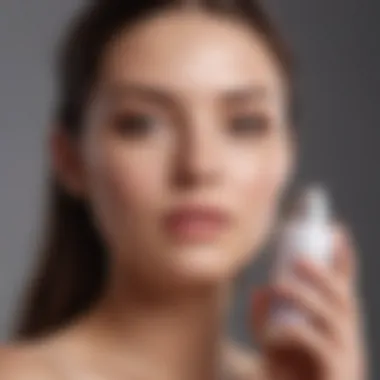Understanding Retinol in Differin: A Deep Dive


Intro
Exploring the realm of skincare often leads us to various ingredients, among which retinol stands out. Differin, commonly known for its effectiveness in treating acne, contains a specific type of retinoid. This article aims to delve into the retinol content in Differin, focusing on its concentration, benefits, and recommendations for optimal usage. This examination provides crucial information for anyone looking to enhance their skincare routine and understand what they are applying on their skin.
The Retinol Content in Differin
Differin contains adapalene, a third-generation topical retinoid. While not retinol in the classic sense, adapalene acts similarly but with distinct advantages for users. It works on a cellular level, normalizing skin turnover and reducing the formation of acne. The concentration of adapalene in Differin is typically 0.1% for over-the-counter formulations and 0.3% for prescription versions.
How Adapalene Works
Adapalene promotes exfoliation and prevents pore clogging, which are essential factors in managing acne. This compound influences skin cells to behave more like healthy cells. The regular use of Differin not only targets acne but also helps in improving overall skin texture and tone.
Benefits of Using Differin
Some key benefits of Differin include:
- Effective Acne Treatment: Studies show that adapalene effectively treats moderate acne with fewer side effects compared to traditional retinoids.
- Anti-Aging Properties: Regular use may help diminish fine lines and wrinkles.
- Improved Skin Texture: Users often report smoother skin due to enhanced cell turnover.
While benefits are numerous, it is essential to recognize potential limitations and manage expectations when incorporating Differin into a routine.
Limitations and Considerations
Though Differin is largely beneficial, some aspects require caution. Users may initially experience dryness or irritation, especially during the first few weeks of use. It’s advisable to start with applications every other night, increasing frequency as the skin adapts. Folks with sensitive skin might need to consult healthcare professionals before starting.
Recommended Routine
The proper implementation of Differin into your skincare routine can enhance its effectiveness:
- Cleansing: Start with a gentle cleanser to remove any impurities without stripping the skin.
- Treatment: Apply a pea-sized amount of Differin to affected areas.
- Moisturizing: Follow with a moisturizer to decrease dryness.
- Sunscreen: Daily application of sunscreen is crucial, as retinoids can increase sun sensitivity.
It’s important to note that results are not immediate. Patience and consistency are key to observing noticeable changes in skin condition.
The End
Understanding retinol, specifically the adapalene found in Differin, can empower users to make informed decisions regarding their skincare. By recognizing its properties, benefits, and properly incorporating it into daily routines, consumers can effectively harness its potential. This comprehensive overview helps demystify the science behind Differin, ensuring that users feel confident in their choices as they navigate the intricacies of skincare.
Foreword to Differin
The analysis of Differin's retinol content is crucial for anyone seeking to improve their skincare regimen. Differin, or adapalene, is a notable topical treatment primarily recognized for its effectiveness in addressing acne. Understanding this medication goes beyond mere identification; it requires an exploration of its ingredients and how they interact with skin health. By peeling back the layers of what Differin is and focusing specifically on retinol, we empower users to make informed decisions regarding their skincare treatments.
Differin has gained a reputation among dermatologists and skincare enthusiasts alike. Its active ingredient, adapalene, belongs to the retinoid family and presents both therapeutic and preventative properties. This section serves to establish a foundation for examining the mechanisms by which Differin operates in the realm of skincare. Understanding the importance of retinol in this context is essential for grasping both the advantages and the limitations the product may offer.
What is Differin?
Differin, scientifically known as adapalene, is a synthetic retinoid. It is commonly used as an over-the-counter treatment for acne. Differin works by modulating skin cell turnover, which helps in preventing clogged pores. This is essential in reducing the formation of acne lesions. Not only does it target existing blemishes, but it also works to prevent the emergence of new acne.
Differin is unique because it is less irritating than some other retinoids. This attribute makes it an appealing choice for individuals with sensitive skin, as it offers an effective solution without the severe side effects often associated with traditional retinoids. The product is usually available in gel or cream formulations, catering to various skin types and preferences.
The Role of Retinol in Skincare
Retinol is a derivative of Vitamin A and plays a significant role in skincare. It is known for enhancing skin texture and tone while addressing multiple concerns, from acne to signs of aging. Retinol acts at the cellular level, promoting rapid cell turnover and encouraging the shedding of dead skin cells. This process is crucial for allowing fresh, new skin to surface, resulting in a more youthful appearance.
Moreover, the role of retinol extends into collagen synthesis. Collagen is a protein that provides structure and elasticity to the skin. By promoting collagen production, retinol helps combat fine lines and wrinkles, delivering anti-aging benefits. However, the efficacy of retinol products can vary significantly, depending on their formulation and concentration.


In summary, understanding both Differin and retinol's workings gives consumers valuable insight. With an informed perspective, individuals can better navigate their skincare choices effectively, ensuring they select products that align with their skin goals and types.
Understanding Retinol
Understanding retinol is crucial for anyone looking to enhance their skincare regimen, especially when considering products like Differin. Retinol, a derivative of vitamin A, has gained recognition for its potential to address various skin concerns, including acne and early signs of aging. This section will delve into the defining characteristics of retinol, as well as its benefits and roles in skincare. Moreover, a solid grasp of how retinol operates at a biological level can inform users about what to expect from products containing this potent ingredient.
What is Retinol?
Retinol is a compound belonging to the retinoid family, which is known for its ability to influence skin cell functions. As a fat-soluble vitamin A derivative, retinol is essential for numerous processes in the body, including vision and immune function. In skincare, it serves as an active ingredient that promotes cell turnover and encourages the production of new skin cells. This quality makes retinol particularly effective for treating conditions such as acne and uneven skin texture.
Besides its role in managing acne, retinol is also acknowledged for its capacity to reduce the appearance of fine lines and wrinkles. Users frequently seek out products containing retinol to improve skin tone and boost complexion clarity.
Mechanism of Action
The mechanism of action of retinol involves its penetration deep into the skin. Once applied, retinol converts into retinoic acid through a series of biochemical reactions. This active form of the vitamin binds to specific receptors in skin cells, regulating gene expression related to cell growth and differentiation.
Here are key points about its mechanism:
- Stimulates Collagen Production: Retinoic acid enhances the synthesis of collagen, which provides structural support to the skin.
- Increases Cell Turnover: It accelerates the process of shedding dead skin cells and replacing them with fresh, new ones, thereby improving skin texture and tone.
- Regulates Oil Production: By influencing sebaceous glands, it can help lower the likelihood of clogged pores and the development of acne.
"Retinol's ability to alter skin at a cellular level has made it a fundamental component in the fight against aging and acne."
Being aware of how retinol functions helps users set realistic expectations for their skincare routine. With consistent application, individuals can observe improvements in their skin over time. However, understanding the specific actions of retinol is essential for integrating it into one’s regimen safely and effectively.
The Specifics of Differin's Retinol Content
Understanding the specifics of Differin's retinol content is critical for individuals seeking effective skincare solutions. Differin, known scientifically as adapalene, is a retinoid that is often used to treat acne. Its formulation has distinct properties that set it apart from other retinol products. By examining the concentration of retinol and comparing it to other options on the market, users can make informed choices regarding their skincare routines.
Concentration of Retinol in Differin
Differin contains a specific concentration of adapalene, which is often referred to as a retinoid, but its function is similar to that of traditional retinol. The typical concentration in over-the-counter Differin products is 0.1% adapalene. This concentration is effective yet gentle enough for most skin types.
The significance of this 0.1% concentration lies in its ability to reduce acne through cell turnover, preventing clogged pores and decreasing inflammation. Users may experience a range of results, from fewer breakouts to a smoother complexion. However, it is essential to note that the effects of retinol can take time. Initial results might not be visible for several weeks.
Here are some key points regarding the concentration of retinol in Differin:
- Effective in treating acne
- Helps with cell turnover
- Typically, a noticeable improvement takes several weeks
- Lower risk of irritation compared to higher concentrations
Comparative Analysis of Differin and Other Retinol Products
When comparing Differin to other retinol products, it is important to consider both the effectiveness and potential side effects. Differin stands out because it is specifically formulated to target acne while minimizing irritation. Unlike some other retinol creams that may cause dryness and peeling, Differin is often tolerated better by users.
In contrast, products like Retin-A (tretinoin) have higher concentrations and are effective for both acne and anti-aging but can lead to more significant skin irritation. Many find the transition to such products challenging due to their strength and resulting side effects.
Here is a quick comparison between Differin and other common retinol products:
- Differin: 0.1% adapalene; targets acne, lower irritation.
- Retin-A: Higher concentrations; used for acne and aging; greater risk of irritation.
- Over-the-counter retinol creams: Vary in concentration; often less effective for acne but can be used for anti-aging.
Both users of Differin and other retinol products should watch for skin responses. While Differin is generally well-tolerated, some may still experience initial dryness or irritation. This can often be managed by introducing the product gradually into the skincare routine.
By knowing the concentration and how it compares to other products, consumers can make educated skincare choices.
Benefits of Using Retinol in Differin
Using retinol, specifically in Differin, offers a range of benefits that are particularly relevant for individuals dealing with skin issues, be it acne or early signs of aging. Retinol is acknowledged as a potent skincare ingredient and has become a staple in various skincare regimens. Its multifaceted application necessitates a deeper exploration of its advantages in the context of Differin, which combines retinol with its unique formulation designed for effective results.


Acne Treatment
One of the prominent benefits of Differin with retinol is its effectiveness in treating acne. Acne can be influenced by several factors, including excess oil production, clogged pores, and inflammation. The retinol present in Differin works to address these issues through multiple mechanisms:
- Unclogs pores: Differin helps to prevent the formation of comedones, which are the precursors to acne. By promoting cell turnover, it aids in sloughing off dead skin cells, thereby preventing them from blocking pores.
- Reduces inflammation: The anti-inflammatory properties of retinol can help diminish the redness and swelling often associated with acne lesions. This makes the skin appear calmer and smoother.
- Regulates oil production: Retinol can help normalize sebum production, reducing the likelihood of developing new acne. This is particularly beneficial for those with oily skin types.
In clinical studies, many users have reported significant improvements in their skin clarity after consistent use of Differin. This not only enhances physical appearance but also contributes to increased self-confidence.
Anti-Aging Benefits
Beyond acne treatment, retinol in Differin also provides essential anti-aging benefits. As the skin ages, it undergoes various changes, including loss of elasticity, fine lines, and uneven skin tone. Differin’s retinol addresses these issues effectively:
- Stimulates collagen production: Retinol helps in boosting collagen synthesis, which is crucial for maintaining skin firmness and elasticity. Increased collagen levels can lead to a reduction in fine lines and wrinkles.
- Improves skin texture: Regular use of Differin can smooth out rough patches and enhance the overall texture of the skin. This leads to a revitalized and more youthful appearance.
- Evens skin tone: Differin can also assist in fading hyperpigmentation and dark spots, resulting from sun damage or aging. By promoting even distribution of melanin, it enhances skin uniformity.
"Retinol is revered not merely for its immediate effects, but for the holistic improvements it fosters over time."
The integration of Differin into a skincare routine thus holds significant importance for users aiming not just for transient results, but for lasting skin improvement. Balancing the benefits of acne management with anti-aging effects makes Differin a compelling option in a comprehensive skincare regimen. This dual utility reinforces the value of understanding and incorporating retinol effectively.
Potential Side Effects of Differin
When considering the use of Differin, it is crucial to address the potential side effects that may arise. Recognizing these aspects helps consumers make educated decisions regarding their skincare regimen. While Differin can provide significant benefits for acne treatment and skin texture improvement, understanding its drawbacks ensures responsible usage. Adverse effects can discourage continued use, so awareness and management strategies are vital.
Common Side Effects
Differin, containing adapalene, can lead to several common side effects. These effects may not occur in every individual, but they are important to monitor. Some of the most frequently reported side effects include:
- Irritation: This can present as redness or a burning sensation after application.
- Dryness: Increased dryness is typical, especially during the initial stages of use.
- Peeling: Users often experience flaking skin, a sign of increased cellular turnover.
- Sensitivity: Skin may become more sensitive to environmental factors such as sun exposure.
Understanding these reactions can help users anticipate and address these issues early in their Differin journey. Experiencing any of these side effects does not necessarily mean treatment should stop, but observation is recommended.
Managing Sensitivity
Addressing and managing sensitivity while using Differin is essential for maintaining a balanced skincare routine. Here are several approaches to effectively handle potential side effects:
- Start Slowly: Introduce Differin into your routine gradually. Begin with every other night or every third night to allow your skin to adapt.
- Moisturize: Use a gentle, fragrance-free moisturizer to combat dryness and irritation, applying it after Differin to create a hydrating barrier.
- Sun Protection: Daily sunscreen application is essential, as Differin increases photosensitivity. Opt for broad-spectrum SPF products to protect the skin.
- Avoid Irritating Products: Refrain from combining Differin with other potent ingredients, like alpha hydroxy acids or beta hydroxy acids, especially when starting treatment.
- Consult a Dermatologist: If side effects persist or worsen, consider seeking guidance from a skincare professional for personalized advice.
"The key to using Differin effectively lies in understanding your skin and adjusting your application strategy to prevent adverse reactions."
By following these steps, users can successfully navigate the possible side effects of Differin, ensuring a more positive experience with this retinol product.
How to Use Differin Effectively
Using Differin correctly is crucial for maximizing its benefits. Differin, which contains adapalene, is a retinoid that can significantly improve skin texture and reduce acne. However, understanding how to apply it properly is essential to avoid side effects and achieve the desired results. This section outlines important guidelines for application and tips for integrating it into your daily skincare routine.
Application Guidelines
Applying Differin correctly ensures that the active ingredient works effectively while minimizing potential irritations. It is advisable to follow these steps for optimal application:
- Cleanse Your Face: Use a gentle cleanser suited for your skin type. This removes impurities and prepares your skin for product absorption.
- Pat Dry the Skin: After cleansing, gently pat your face with a towel. Do not rub, as this can irritate your skin.
- Apply Differin: Take a pea-sized amount and spread it evenly across your face. Focus on affected areas but avoid the eyes and mouth.
- Allow Time to Absorb: Wait for about 20-30 minutes before applying any other products. This helps the treatment to be fully absorbed, maximizing its effectiveness.
- Use Sunscreen in the Morning: Differin can increase sun sensitivity. Daily use of a broad-spectrum sunscreen with a minimum SPF of 30 is critical.
Integrating Differin into Your Skincare Routine
Incorporating Differin into your daily regimen requires careful consideration to enhance its benefits:


- Evening Use: Most dermatologists recommend using Differin at night. Nighttime application takes advantage of skin’s natural repair processes.
- Layering Products: If you use other active compounds (like vitamin C or acids), layer them strategically. Start with Differin, wait 10-15 minutes, then apply other products.
- Moisturizer: Follow up with a non-comedogenic moisturizer to maintain hydration and help mitigate dryness. This can balance the potent effects of Differin.
- Adjustment Period: Your skin may need time to adjust. Expect some dryness or peeling, especially in the beginning. This is normal but should improve over time.
Long-term Considerations with Retinol Use
The long-term use of retinol can significantly shape skincare routines and outcomes. It is essential for users to understand what to expect and how to navigate the journey. Knowledge of retinol's long-term implications helps to maximize benefits while minimizing potential issues. This section explores two critical aspects of retinol use: the expected results and longevity of effects.
Expected Results
When using Differin, consistent application over time often yields noticeable improvements in skin texture and tone. The expected results include:
- Reduced Acne: Regular use of Differin can decrease acne breakouts by normalizing skin cell turnover, thereby preventing clogged pores.
- Improved Skin Texture: Users may notice smoother skin, as retinol aids in the gradual shedding of dead skin cells. This can result in a more refined appearance.
- Faded Dark Spots: Over months, the use of retinol can lead to a reduction in the appearance of hyperpigmentation and dark spots, providing a more even skin tone.
- Minimized Fine Lines: As a long-term benefit, many users experience a decrease in the visibility of fine lines and wrinkles, thanks to the collagen-boosting effects of retinol.
It’s important to keep expectations realistic. While some results may appear in the short term, significant changes usually require sustained use over many weeks to months.
Longevity of Effects
Once the initial results are observed, understanding how long they can be maintained is crucial. The longevity of effects from Differin can be influenced by several factors:
- Consistency of Use: Regular application of Differin is vital to maintain results. Skipping applications may lead to regression in skin improvements.
- Skin Adaptation: Over time, the skin may adjust to retinol, leading to a plateau in the visible results. Switching to a higher concentration or altering formulations may be necessary for continued progress.
- Supportive Skincare Regimen: Complementing Differin with other beneficial products, such as sunscreen and moisturizers, tends to enhance and prolong results.
- Periodic Breaks: Some users find that taking breaks from retinol allows the skin to reset and may rejuvenate the effectiveness upon resuming.
The sustainability of benefits gained from retinol often requires a committed skincare routine alongside a deep understanding of personal skin needs.
Alternatives to Differin
The topic of alternatives to Differin is significant for various reasons. Numerous users may find that Differin does not fully meet their skincare needs or that they seek additional options beyond this well-known retinol product. By exploring alternatives, users can identify other effective retinol products or natural substitutes that align with their specific skin types and concerns.
Differin, containing adapalene, is a popular choice for many individuals addressing acne and signs of aging. However, some may experience unwanted side effects such as irritation or redness. This can lead to the pursuit of other retinol options that offer similar benefits with potentially fewer adverse effects. In this section, we will discuss both conventional alternatives and natural substitutes, examining their effectiveness, concentration levels, and how they compare to Differin.
Other Retinol Products
Several retinol-containing products present viable alternatives to Differin. Below are some prominent examples:
- Retin-A (Tretinoin): Often regarded as the gold standard for retinoids, Retin-A is more potent than Differin. It can effectively treat acne and visible signs of aging but may also cause more pronounced irritation.
- The Ordinary Granactive Retinoid 2% Emulsion: Known for being user-friendly, this product is suitable for those who want a gentler retinoid experience. It provides less irritation while still promoting skin renewal.
- Neutrogena Rapid Wrinkle Repair: This over-the-counter cream combines retinol with hyaluronic acid, which can be helpful for dry skin. This formulation helps to hydrate while reducing fine lines.
- Olay Regenerist Retinol 24 Night Moisturizer: This product promises overnight results by combining retinol with niacinamide. It is designed to smooth texture and improve overall skin appearance.
When considering any alternative, evaluate the retinol concentration, formulation, and specific skin concerns. A higher concentration may lead to faster results but also higher chance of side effects.
Natural Alternatives to Retinol
For individuals seeking gentler, more natural options, a variety of products exist that mimic the benefits of retinol without harsh side effects. Some alternatives include:
- Bakuchiol: This plant-derived ingredient is often cited as a natural alternative to retinol. Studies suggest it may provide anti-aging benefits similar to retinol but with less irritation.
- Rosehip Oil: Rich in essential fatty acids and antioxidants, rosehip oil can promote skin regeneration and improve the appearance of scars and fine lines.
- Vitamin C: While not a direct alternative, vitamin C serum can brighten the skin, improve texture, and stimulate collagen production, complementing retinol’s benefits without the irritation.
- Peptides: These small proteins help to stimulate collagen production and bring a youthful appearance to the skin. They work effectively as an alternative or accompaniment to retinol.
It should be noted that natural alternatives may not offer results as quickly as traditional retinol products, but they can be an option for those with sensitive skin.
In summary, understanding the alternatives to Differin is crucial. Knowledge of other retinol products and natural substitutes opens up a range of options for individuals seeking effective skincare solutions tailored to their needs.
Finding the right product often requires some trial and error, but being informed on available alternatives is an essential step in any skincare routine.
Ending
The conclusion of this article serves as a crucial summation of the insights gained regarding Differin and its retinol content. Understanding retinol's role in skincare, particularly in products like Differin, is essential for consumers seeking effective solutions for their skin concerns. The analysis provided throughout the article assists readers in grasping the complexities of how retinol operates within their routines and highlights the importance of concentration, application, and long-term effects.
Final Thoughts on Differin
Differin, containing adapalene, is often hailed for its efficacy in treating acne and providing anti-aging benefits. Its formulation is distinct as it represents a synthetic retinoid, setting it apart from traditional retinol options. Many users report noticeable improvements in their skin texture and overall vitality after consistent use. However, individual results can vary based on skin type, concerns, and adherence to guidelines. Thus, users should approach Differin with realistic expectations, prepared for an adjustment period, as skin acclimates to retinoid treatment.
Making Informed Choices
In light of the comprehensive information provided, making informed choices about incorporating Differin into a skincare regimen becomes paramount. Consumers should evaluate their skin needs and desired outcomes critically before choosing Differin or any retinol product. Reading labels, understanding ingredients, and researching benefits and potential side effects plays a vital role in attaining successful results.
In addition, consulting with a dermatologist can provide personalized guidance tailored to specific skin types and concerns. The right approach can maximize the benefits of retinol, ensuring a balanced and effective skincare routine that aligns with individual goals.







